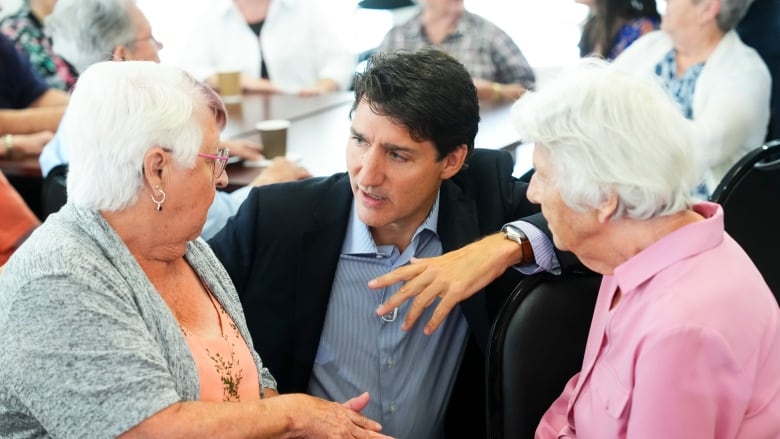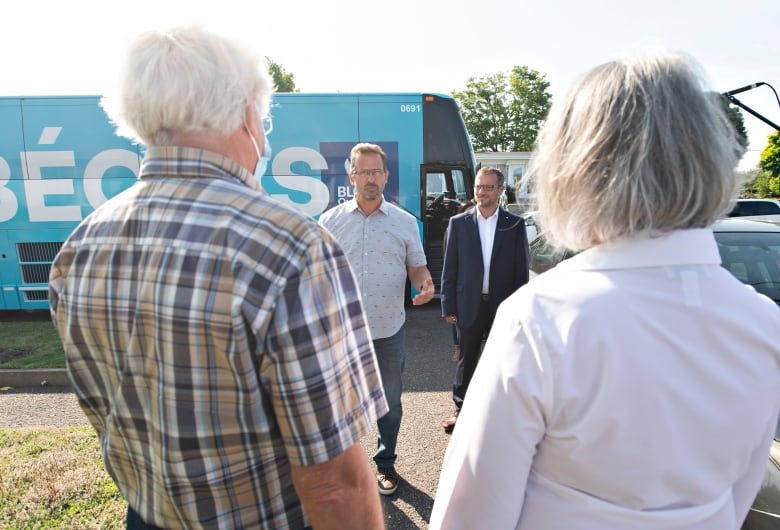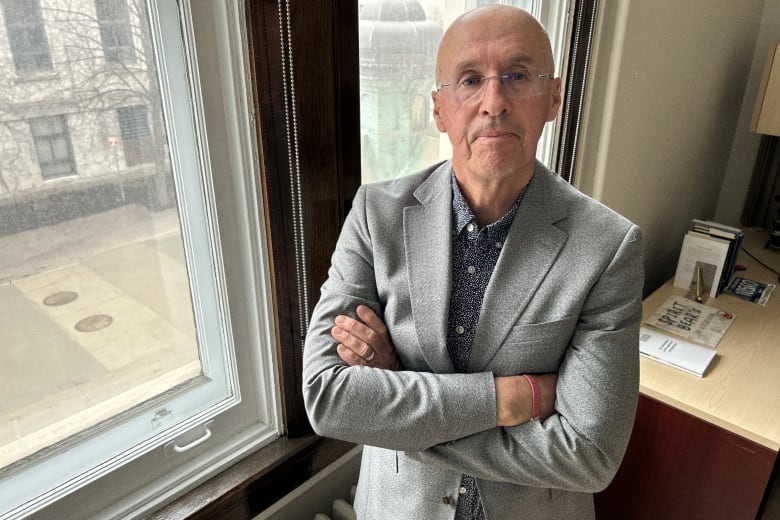There's a battle brewing over generational fairness as Bloc Qubcois demands a pension hike
Elderly benefits are already the largest and fastest-growing part of the federal budget

A debate over how Ottawa chooses to divide its spending among age cohorts is ramping upas the Bloc Qubcois pushes the Liberal minority government to boost Old Age Security (OAS) payments.
Bloc Leader Yves-Franois Blanchet put forward a motion Tuesday demanding that the government move forward with legislation that would hike OASpayouts for seniors between the ages of 65 and 74 by 10 per cent.
The Bloc has said it will only continue supporting the Liberal government on future non-confidence votes if it gets anOAS hike before the end of this month. It also wants stronger trade protections for supply-managed farm sectors.
Benefits for the elderly, including OAS and the Guaranteed Income Supplement (GIS) for low-income seniors, already constitute the largest and fastest-growing part of the federal budget.
The cost of elderly benefits is projected to rise from $80 billion this yearto $100 billion annually by 2028-29 a figure that doesn't take into account this proposed 10 per cent hike.
And the federal government already spends more on elderly benefits than on other major programs that disproportionately benefit younger peoplesuch as Employment Insurance (EI) ($26.6 billion), the Canada Child Benefit ($28.1 billion)and the national child care program ($6.6 billion).
In fact, about 17 per cent of all federal program spending goes to the elderly. Ottawa transfers more to seniors directly than it does to other levels of government to fund health care ($52 billion).
The Canada Pension Plan (CPP) is funded by employee and employer contributions, not through general tax revenues like the other two federal retirement benefits.
The Parliamentary Budget Officer (PBO) has said the Bloc's proposed OAS increase would cost $16 billion over the next five years spending that wouldadd to a national debt that is now over $1.2 trillion. The cost of financing all that debt comes to about $54 billion this year.
"We have to look at the intergenerational impacts of something like that. It's a lot of money ... it's not insignificant, so we have to look at this very carefully," Environment Minister Steven Guilbeault told reporters Tuesday.
"Are seniors the people in society who need it the most right now? We see how young people are having difficulty at the moment. Butit's a discussion that must take place," he added in French.
The Liberal government hasn't said how it will vote on today's motion.
Prime Minister Justin Trudeau's cabinet ministers have been instead touting the government's fledglingdental careand forthcomingpharmacareprograms as proof they are committedto helping seniors.
"We have supported seniors, importantly vulnerable seniors, in many, many ways since 2015," Public Services Minister Jean-Yves Duclos told reporters.
"We changed this terrible policy thatStephen Harper announced," he added, referring to the previous Conservative commitment toraise theretirement age to 67.
While refusing to say how thecabinet will vote, Duclos talked down the Bloc initiative.
"The Bloc's bill, no matter how well-intentioned, is not helping the most vulnerable seniors," he said, adding single, low-income seniors stand to gain less than wealthier seniors in a couple. "That's an important flaw of his bill."

Statistics Canadadata from 2019shows people 65 and older already make up one of the wealthiest age cohorts in the country, with a median net worth of $543,200, compared to $234,400 for people aged 35 to 44.
People over the age of 65 are also less likely to be considered low income, according to StatisticsCanada data from 2022.
In fact, seniors have the lowest poverty rates of all age groups. About 11 per cent of people aged 18 to 64 years of age are classified as "low income," compared to just six per cent for people 65 and over, the data shows.
The Liberal government's last budget, titled, "Fairness for every generation," was crafted to appeal to millennial and generation Z voters who are feeling left behind as home prices continue to march higher. Rising home prices are good newsfor home-owning seniors but a drag on the finances ofyounger households.
The centrepiece of that budget was a housing initiative that will cost the treasury just a fraction of what will be spent annually on OAS or GIS.
Blanchet said seniors deserve "a significantincrease to their purchasing power because they literally built Quebec and the prosperity we all have and enjoy today."
He said the young people in his life are doing well.
"They have a standard of living that we could never have envisioned and I'm very happy about that," he said in French during debate on his motion Tuesday.
"And I think those who built this world for them need to be adequately treated for having done that."
Blanchet said the Liberal government's move tohike OAS payouts for people 75 and olderin 2022 led to a form of "discrimination" because younger eligible seniors get less.
Part of the Bloc's voting base is elderly people in small population centres outside of Montreal and Quebec City.

"This is an opportunity to get some significant gains for seniors," Blanchet said. "If the government doesn't accept our request,they don't want to be helpful to millions of Canadians and Quebecers."
Generation Squeeze, an advocacy group for young people, has said that if the Bloc gets its way, "younger Canadians will be on the hook to pay even more taxes for boomers' OAS benefits."
That's unfair because younger people are already grappling with higher housing costs, larger student debts and future costs associated with climate-related natural disasters, the group said.
"Rather than be held hostage by the Bloc, Ottawa should help economically insecure retirees by modernizing OAS to better target benefits. This would ask relatively affluent boomers to contribute more to the income needs of its generation, rather than punt expenses to their offspring," Paul Kershaw, the group's founder, said in a recent op-ed.
While refusing to say how the Liberal caucus will vote, Finance Minister ChrystiaFreeland said she takes Kershaw's "analysis and those concerns seriously."

Kevin Page, a former PBO, isan expert on the federal government's financesand the founder of the Institute of Fiscal Studies and Democracy (IFSD).
He said there is data to suggest some seniors do need help as their incomes are lagging other cohorts, but he raised some red flags about the Bloc's proposal.
"I can empathize with seniors that are struggling with affordability challenges. I do not empathize with political leaders proposing to deficit-finance increases to social transfers. The latter is not fair to younger and future generations," he told CBC News.
Page said taking on more debt to fund thingslike a richer OASis "not good policy from the standpoint of fiscal responsibility and intergenerational fairness not ever and not in the currenteconomic environment."
"If opposition political parties want to propose enriched social programs in the current minority Parliament, they should also consider proposing expenditure savings or tax increases," Pagesaid.
Page said that, as a grandfather, he'd like to see the federal government "focus its policy attention to the challenges facing our young and future generations."

But Blanchet said his party is not open to any possibletweaks to its proposal.
"There's nothing to negotiate. You do this before Oct. 29 or we negotiatewith other opposition parties to have the government fall," Blanchettold reporters.
"There's absolutely no room to manoeuvre whatsoever."
For the Bloc's pension legislation to become law, the Liberal government would have to grant a "royal recommendation" because a private member's bill can't force Ottawa to spend more money without cabinetapproval.
The Bloc's motion Tuesday is an attempt to force the government to deliver that recommendation so that the pension legislation can sail through Parliament.















_(720p).jpg)


 OFFICIAL HD MUSIC VIDEO.jpg)
.jpg)



























































































